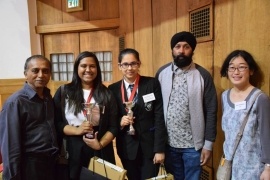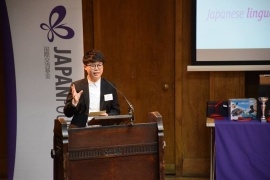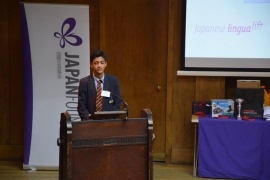Nihongo Cup Japanese Speech Contest for Secondary School Students 2016
2016/6/29



The Nihongo Cup Japanese Speech Contest for Secondary School Students was held by the Japan Foundation at Conway Hall in London on 18 June 2016. Since last year it has been open to the public in order to encourage more young people to study Japanese.
This year the topics of the speeches were as colourful as ever. “My Ideal School” was the theme for Key Stage 3 participants, while creative topics were chosen individually by Key Stage 4 and 5 (Pre-GCSE and Post-GCSE) pupils.
There were 18 finalists who had been selected from 147 applicants from 20 different schools across the UK. They delivered speeches that were both interesting and of an impressive standard, in fluent Japanese in front of an audience numbering over 100. Despite speaking in a foreign language, all of the contestants demonstrated a sound grasp of their subject, full of engaging insights.
In addition, the audience had the opportunity to watch a student performance of a Japanese story with music and song. They were also able to try rajio taisō, a time-honoured and highly popular keep-fit radio programme in Japan.
The excellent quality of all the speeches delivered by the finalists provided the judges with an extremely tough challenge. The following three contestants were awarded first prize in their respective categories: Krishanth Dilrukshan (Key Stage 3: “My Ideal School”), who outlined his ideas on how to make his current school more fun and interesting; Taranpreet Kalra (Key Stages 4 and 5 Pre-GCSE: “Is There Racial Discrimination?”), who focused on the issue of racial prejudice; and Shanara Atukorala (Key Stages 4 and 5 Post-GCSE), who talked about the Japanese story Ooi, Detekooi written by Shinichi Hoshi, for which she won the top prize of a trip to Japan courtesy of JOBA’s Japanese Speech Awards.
There were many other students who took part in this speech contest, and it is hoped that all of them will maintain their interest in the Japanese language and continue their studies. Moreover, the Embassy of Japan looks forward to more young people becoming interested in learning how to communicate in Japanese. For more information and photographs of the contest, please click here: http://www.jpf.org.uk/news.php.
This year the topics of the speeches were as colourful as ever. “My Ideal School” was the theme for Key Stage 3 participants, while creative topics were chosen individually by Key Stage 4 and 5 (Pre-GCSE and Post-GCSE) pupils.
There were 18 finalists who had been selected from 147 applicants from 20 different schools across the UK. They delivered speeches that were both interesting and of an impressive standard, in fluent Japanese in front of an audience numbering over 100. Despite speaking in a foreign language, all of the contestants demonstrated a sound grasp of their subject, full of engaging insights.
In addition, the audience had the opportunity to watch a student performance of a Japanese story with music and song. They were also able to try rajio taisō, a time-honoured and highly popular keep-fit radio programme in Japan.
The excellent quality of all the speeches delivered by the finalists provided the judges with an extremely tough challenge. The following three contestants were awarded first prize in their respective categories: Krishanth Dilrukshan (Key Stage 3: “My Ideal School”), who outlined his ideas on how to make his current school more fun and interesting; Taranpreet Kalra (Key Stages 4 and 5 Pre-GCSE: “Is There Racial Discrimination?”), who focused on the issue of racial prejudice; and Shanara Atukorala (Key Stages 4 and 5 Post-GCSE), who talked about the Japanese story Ooi, Detekooi written by Shinichi Hoshi, for which she won the top prize of a trip to Japan courtesy of JOBA’s Japanese Speech Awards.
There were many other students who took part in this speech contest, and it is hoped that all of them will maintain their interest in the Japanese language and continue their studies. Moreover, the Embassy of Japan looks forward to more young people becoming interested in learning how to communicate in Japanese. For more information and photographs of the contest, please click here: http://www.jpf.org.uk/news.php.

